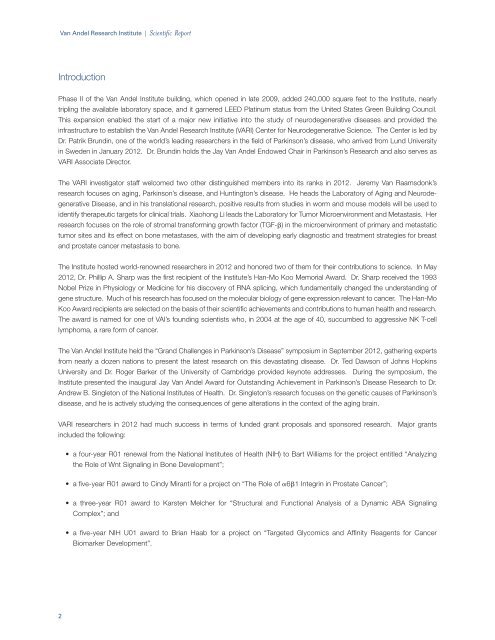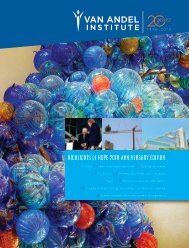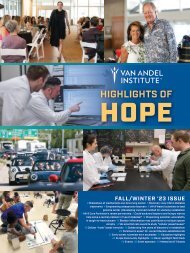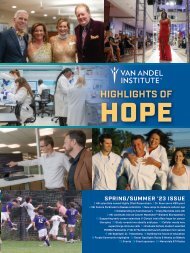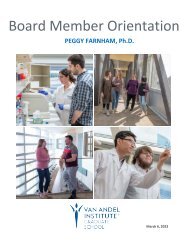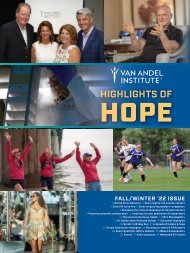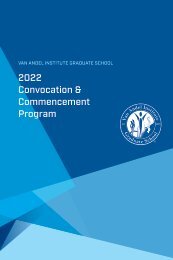2013 Scientific Report
You also want an ePaper? Increase the reach of your titles
YUMPU automatically turns print PDFs into web optimized ePapers that Google loves.
Van Andel Research Institute | <strong>Scientific</strong> <strong>Report</strong><br />
Introduction<br />
Phase II of the Van Andel Institute building, which opened in late 2009, added 240,000 square feet to the Institute, nearly<br />
tripling the available laboratory space, and it garnered LEED Platinum status from the United States Green Building Council.<br />
This expansion enabled the start of a major new initiative into the study of neurodegenerative diseases and provided the<br />
infrastructure to establish the Van Andel Research Institute (VARI) Center for Neurodegenerative Science. The Center is led by<br />
Dr. Patrik Brundin, one of the world’s leading researchers in the field of Parkinson’s disease, who arrived from Lund University<br />
in Sweden in January 2012. Dr. Brundin holds the Jay Van Andel Endowed Chair in Parkinson’s Research and also serves as<br />
VARI Associate Director.<br />
The VARI investigator staff welcomed two other distinguished members into its ranks in 2012. Jeremy Van Raamsdonk’s<br />
research focuses on aging, Parkinson’s disease, and Huntington’s disease. He heads the Laboratory of Aging and Neurodegenerative<br />
Disease, and in his translational research, positive results from studies in worm and mouse models will be used to<br />
identify therapeutic targets for clinical trials. Xiaohong Li leads the Laboratory for Tumor Microenvironment and Metastasis. Her<br />
research focuses on the role of stromal transforming growth factor (TGF-b) in the microenvironment of primary and metastatic<br />
tumor sites and its effect on bone metastases, with the aim of developing early diagnostic and treatment strategies for breast<br />
and prostate cancer metastasis to bone.<br />
The Institute hosted world-renowned researchers in 2012 and honored two of them for their contributions to science. In May<br />
2012, Dr. Phillip A. Sharp was the first recipient of the Institute’s Han-Mo Koo Memorial Award. Dr. Sharp received the 1993<br />
Nobel Prize in Physiology or Medicine for his discovery of RNA splicing, which fundamentally changed the understanding of<br />
gene structure. Much of his research has focused on the molecular biology of gene expression relevant to cancer. The Han-Mo<br />
Koo Award recipients are selected on the basis of their scientific achievements and contributions to human health and research.<br />
The award is named for one of VAI’s founding scientists who, in 2004 at the age of 40, succumbed to aggressive NK T-cell<br />
lymphoma, a rare form of cancer.<br />
The Van Andel Institute held the “Grand Challenges in Parkinson’s Disease” symposium in September 2012, gathering experts<br />
from nearly a dozen nations to present the latest research on this devastating disease. Dr. Ted Dawson of Johns Hopkins<br />
University and Dr. Roger Barker of the University of Cambridge provided keynote addresses. During the symposium, the<br />
Institute presented the inaugural Jay Van Andel Award for Outstanding Achievement in Parkinson’s Disease Research to Dr.<br />
Andrew B. Singleton of the National Institutes of Health. Dr. Singleton’s research focuses on the genetic causes of Parkinson’s<br />
disease, and he is actively studying the consequences of gene alterations in the context of the aging brain.<br />
VARI researchers in 2012 had much success in terms of funded grant proposals and sponsored research. Major grants<br />
included the following:<br />
• a four-year R01 renewal from the National Institutes of Health (NIH) to Bart Williams for the project entitled “Analyzing<br />
the Role of Wnt Signaling in Bone Development”;<br />
• a five-year R01 award to Cindy Miranti for a project on “The Role of a6b1 Integrin in Prostate Cancer”;<br />
• a three-year R01 award to Karsten Melcher for “Structural and Functional Analysis of a Dynamic ABA Signaling<br />
Complex”; and<br />
• a five-year NIH U01 award to Brian Haab for a project on “Targeted Glycomics and Affinity Reagents for Cancer<br />
Biomarker Development”.<br />
2


